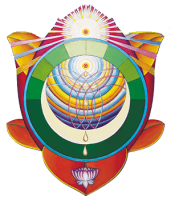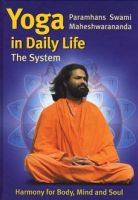Bindu Chakra
Bindu = point, drop
Who has not at some stage dreamt of the “fountain of eternal youth”, and wished to find it? As in most sagas and myths there is also a kernel of truth in this. For this fountain of youth, vitality and health is located in the Bindu Chakra – one of the most mysterious and remarkable energy centres in the human body.
The Bindu Chakra lies beneath the cowlick that most people have at the back of their head. Anatomically it is located where the bones of the back and sides of the skull meet (the occiput and the parietal). The direction of the stream of cosmic energy flowing into the Chakra can be seen quite clearly at this point. Some people have two cowlicks, indicating the existence of two energy centres. These people often possess exceptional vitality and creativity, but on the other hand can also be inclined towards hyperactivity and extreme nervousness. In these cases the method described later in this chapter can help to balance out the energy flow again.
In most Yoga books the Bindu Chakra is not mentioned, but in Tantra Yoga great importance is attached to the healing and rejuvenating effects of this Chakra.
Whilst this energy centre “sleeps” it is similar to a dot, but when awakened its energy begins to flow or to “drip”. The Bindu Chakra produces truly astonishing effects. It is a “health centre” that brings about improved physical, psychic and spiritual health, and is therefore a valuable aid on our spiritual journey. It also helps to quieten our emotions and brings harmony and a sense of wellbeing.
With the help of this Chakra we are able to control hunger and thirst and overcome unhealthy eating habits.
Concentration on the Bindu Chakra can also be beneficial for depression, nervousness, feelings of anxiety and an oppressive feeling within the heart. A slight pressure with the fingernail on the site of the Bindu Chakra gives rise to a spontaneous feeling of happiness that spreads to the heart. When a child is restless and will not go to sleep it helps to gently massage the Bindu Chakra with soft circular movements for a few minutes – the child will soon become quiet and sleepy.
But the most outstanding effect of the Bindu Chakra is the production of AMRITA, the nectar of immortality.
At the beginning of the Peace Mantra it is said:
ASATO MĀ SAT GAMAYA
TAMASO MĀ JYOTIR GAMAYA
MRITYOR MĀ AMRITAM GAMAYA
Lead us from unreality to reality
Lead us from darkness into light
Lead us from death to immortality.
On the physical level this means that with the awakening of the Bindu Chakra the Pineal Gland, which is connected to this centre, becomes active. This gland emits a hormone that has a “fountain of youth” influence on both body and mind. This is why the Rishis gave it the name “Amrita”, nectar of immortality. The more active the Bindu Chakra becomes, the more plentifully this precious Amrita flows. It is said in the ancient scriptures that just one concentrated drop is sufficient to make new shoots grow on a piece of dry wood, and bring the deceased back to life.
In Āyurveda this life-giving nectar is known as Sanjīvini Bhuti . There are Yogis who eat no food and are nourished exclusively by the nectar from the Bindu Chakra. If we were able to utilise this life elixir for our body we would not only prolong our life but also enjoy perfect health. But, unfortunately, this precious nectar normally drips straight down into the fire of the Manipūra Chakra (Jatarāgni) and is burnt before its effects develop. Through certain Yoga practices we can be successful in catching the drops of nectar in the Vishuddhi Chakra and supplying the body. The Vishuddhi Chakra is responsible for the purification and detoxification of the body if an imbalance occurs in the body due to harmful substances.
In the Gheranda Samhitā (Verses 28-30) it is written:
“The Sun is in the navel and the moon in the head. The nectar that comes from the moon is consumed by the sun, and the life force is gradually used up in this way.”
Here the moon stands for the Bindu Chakra and the sun for the Manipūra Chakra. Because the nectar from the Bindu Chakra is constantly being destroyed in the fire of the Manipūra Chakra our body is susceptible to illness and continues to deteriorate with advancing age.
In fact the Ātmā is immortal, but in this earthly existence we are bound to the mortal body. Only in this very fragile body can we attain spiritual realisation and liberation (Moksha). Therefore Yogis endeavour to keep their body healthy for as long as possible to enable them to complete their spiritual development in the current lifespan.
And this is why the Rishis, in ancient times, sought methods by which this valuable nectar could be gathered within the body and its benefits utilised. They found that they could control the flow of nectar with the help of the Vishuddhi Chakra and the tongue. The tongue possesses subtle energy centres, each of which connects to a specific part of the body or organ. Udāna Prāna, one of the five main Prānas (vital forces), works within the Vishuddhi Chakra and this Prāna Vayu activates the muscles in the throat that control the swallowing of food. Udāna Prāna also directs energy to the head. When the nectar is held firmly in the Vishuddhi Chakra and influenced by Udāna Prāna its effect is set in motion. The way it works is similar to Homeopathy; and like homeopathic medicine its beneficial effects are spread through the whole body via the outgoing energy channels in the tongue.
But how are we able to catch this precious nectar with the tongue? Through a technique known as Khecharī Mudrā , which is described in the Hatha Yoga Pradipikā. In this the tongue is rolled back as far as possible until the tip of the tongue reaches deeply into the Pharyngeal cavity. Then the nectar that drips down from the Bindu Chakra can be caught.
In order to be able to roll the tongue back far enough some practise is essential. Yogis achieve this by carefully stretching the ligament beneath the tongue, gradually lengthening it through gentle pulling. In this way the tip of the tongue can finally reach the Uvula.
The benefits of Khecharī Mudrā are strengthened when it is performed together with Ujjāyī Prānāyāma and Jālandhara Bandha (Chin Lock).
Ujjāyī Prānāyāma is a breathing technique with concentration on the process of breathing in the throat. The throat is contracted slightly so that the air flowing through it produces a soft sound, as in deep sleep. Through Jālandhara Bandha the flow of energy is briefly interrupted and the Prāna is held in the throat .
Another very effective practice is Viparitkaranī Mudrā , which has been translated as “The Energy Regeneration Pose” in the system of “Yoga in Daily Life”. The reason for this is that the nectar flows towards the throat in this inverted position and is therefore prevented from being burnt in the Manipūra Chakra.
The symbol of the Bindu Chakra is the MOON; therefore it is also known as Chandra Chakra (Moon Centre). In the inner Cosmos, which is seen by our inner eye in meditation, the Bindu Chakra appears to have a circular opening with a lid almost completely covering it, and from this some light shines forth through a small gap. This glimmer of light that is the emanation of the radiance of the Self in the Sahasrāra Chakra is similar in appearance to the slender crescent of the new moon. If the Bindu Chakra is fully awake and open it shines brightly with a silvery sheen, like the Full Moon.
The moon is a symbol of perfection, nectar and energy. Nature receives life-sustaining Prāna from the moon allowing everything to grow and thrive, as moonlight is also essential for the growth of plants and the ripening of fruit – not only sunlight.
In the Bhagavad Gita (15/13) Lord Krishna says:
“When I come onto the earth, I preserve all beings through my life-giving power. When I become the nectar-giving moon, I nourish the vegetation.”
The moon is the symbol of Lord Shiva, and the Mantra of the Bindu Chakra is AMRITAM – I am immortal. At the end of the Peace Mantra we sing:
OM TRYAMBAKAM YAJĀMAHE SUGHANDHIM PUSHTIVARDHANAM
URVĀRUKAMIVA BHANDANĀN MRITYOR MUKSHĪYA MĀMRITĀT
OM my adored One, the three-eyed Lord Shiva , who is omnipresent
May He nurture us and bless us with health
May His blessings liberate us and lead to immortality.
This Mantra is known as MAHĀ MRITYUN JAYA MANTRA – the glorious Mantra of victory over death.
May the light of Shiva fill our consciousness. May the nectar of immortality spread through and expand our inner space (Chidākāsha). Through this nectar all Chakras are brought into harmony. Fear, sadness, anger, resentment and other disease-producing emotions are released in the healing vibration of this Mantra. May it spread fragrance, melodiousness, love, happiness and contentment through the entire world.


